Since ancient times, the Lingnan region has had the custom of “committing friends with dragons”. The Dragon Boat Festival “Babaylan” is not only a traditional folk activity, but also an important ceremony for people to visit relatives and friends. The dragon head is regarded as the “soul” of the dragon boat. It is a detachable independent component. It has a very different shape and a dragon head with its own charm. It gives each dragon boat team a unique meaning. At the same time, the dragon head is vigorous and beautifully carved, and has become the object of people’s focus.
A craftsmanship, a craft, and a firmness. They use a dragon boat bow to carve traditions, and also carve the spirit of craftsmanship and life.
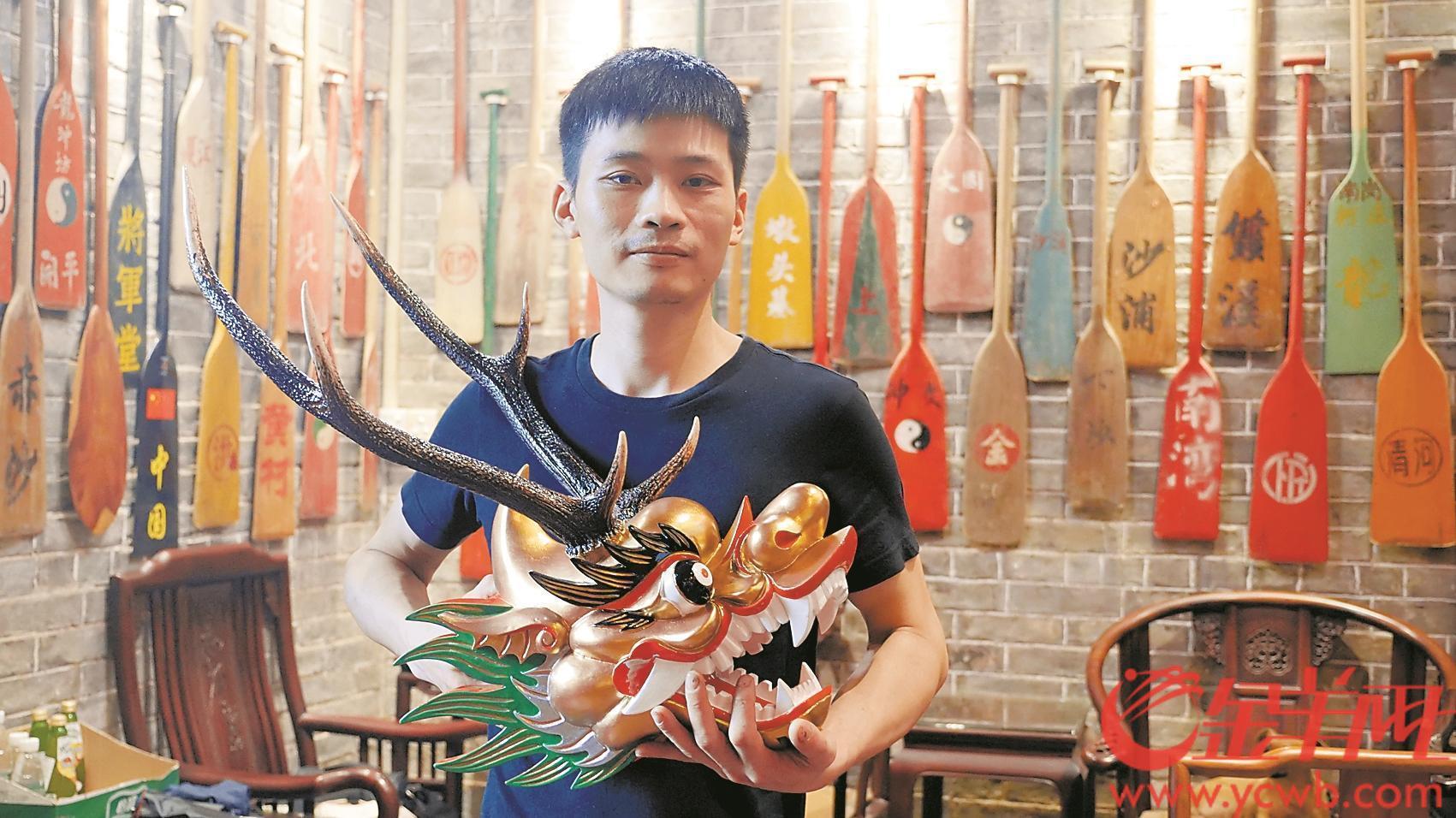 Zhang Weichao has carved dragon boats with dragon heads and tails for more than 20 years. Liu Zhuonan Photo by Liu Zhuonan
Zhang Weichao has carved dragon boats with dragon heads and tails for more than 20 years. Liu Zhuonan Photo by Liu Zhuonan
The “head” who appeared at the Winter Olympics comes from this “post-80s” in Guangzhou
Yangcheng Evening News All-Media Reporter Liu Zhuonan Guo Siqi
In Xiasha Village, Huangpu District, Guangzhou, there is a special ancient ancestral hall. When you walk in, you can see that the blue brick wall is full of oars for dragon boats. On the other side, exquisite dragon heads are arranged scattered, with longan eyes wide open, with flowing beards and majestic and domineering. Walking further, I saw a wide variety of woodcarving tools such as planers, chisels, saws, files, etc. on the ground. Wood chips floated in the air, and the sounds of machines and knocking sounds came one after another. This is Zhang Weichao’s DragonCinema Boat Carving Studio.
Zhang Weichao is a “post-80s”. He has been carving dragon boats with dragon heads and tails for more than 20 years. At the opening ceremony of this year’s Beijing Winter Olympics, in the countdown session set by 24 solar terms, a leader with great Chinese traditional characteristics surfaced with splashes. This is Zhang Weichao’s leading work. From his childhood “playing around” to now moving to the world stage, Zhang Weichao has grown into a well-known dragon boat dragon head and tail carving craftsman in Guangdong, and is also the inheritor of the intangible cultural heritage of this project. He said: “Behind the dragon boat and dragon head skills is our folk culture, our roots and soul.”
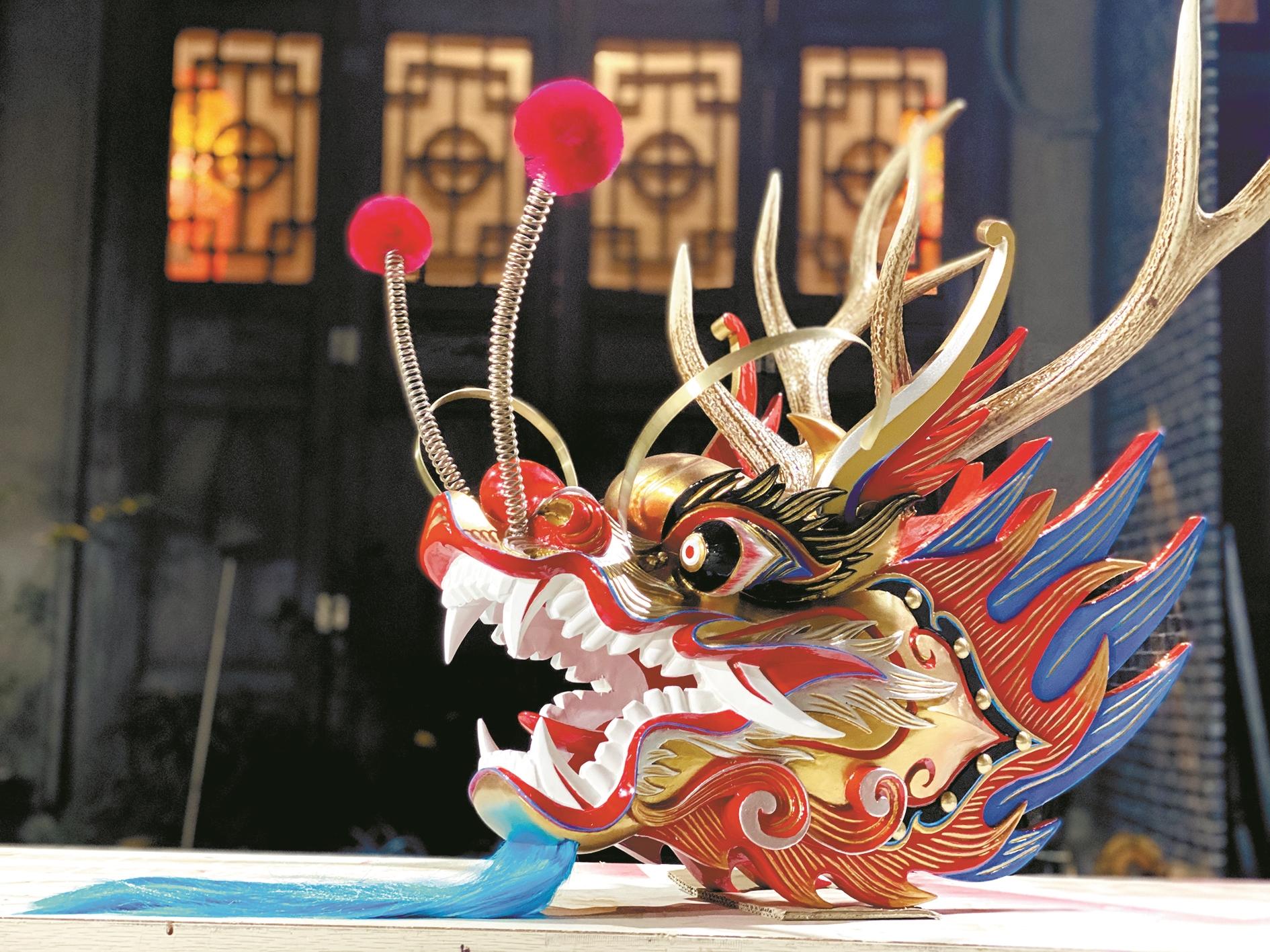 Zhang Weichao’s leading works provided by the intervieweePicture
Zhang Weichao’s leading works provided by the intervieweePicture
From the Origin:
“Dragon boat is the most important cultural mark in my childhood”
Talking about his origin with the dragon boat head, Zhang Weichao said that this was the most important cultural mark in his childhood. “Since I was a child, I loved watching dragon boat racing in the village. Children would make some small toys by themselves, and the model of the dragon boat is one of them.” Zhang Weichao’s father is an old carpenter with a complete range of woodcarving tools at home. He also learned some carving skills. With his interest and talent, he became the “ceiling” of carving dragon boats among his childhood playmates.
At the age of 12, Zhang Weichao sold his first dragon boat model. When he was in junior high school, people from other villages asked him to customize it. Gradually, Zhang Weichao was a little angry. He was still in school at that time and could only use his holidays to work, and a model often took a summer vacation. In order to understand the shape of dragon boats in a more diverse way, as soon as the Dragon Boat Festival comes, Zhang Weichao takes a ruler and a picture book to look at the dragon boats in the surrounding villages and record the data. At other times outside the Dragon Boat Festival, the dragon boats sink under the surging water, so Zhang Weichao often dives to understand the shape of the dragon boat. “Cinema At that time, Babaylan seemed to have entered another small world. If you like these things, you want to study them. Your works have been recognized and you are very proud.” Zhang Weichao said.
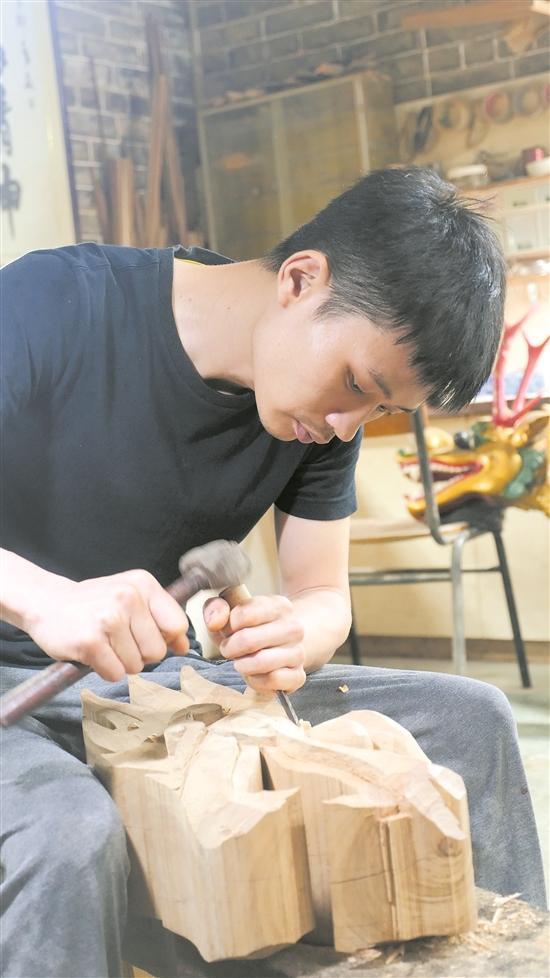 Zhang Weichao is carving the leader of Cinema Liu Zhuonan. Photo by Liu Zhuonan.
Zhang Weichao is carving the leader of Cinema Liu Zhuonan. Photo by Liu Zhuonan.
Turn:
Resigned from the “iron rice bowl” and carving the “leader” full-time.
2009 was a turning point for Zhang Weichao. At that time, he graduated from the auto repair major of vocational school and had been staying at school as a practical teacher for more than a year. It was difficult to take into account both teaching and carving, so he decided to resign and concentrate on dragon boat carving. “It would seem like the whole world is opposing it. “At that time, there were only six or seven dragon boat production factories in Guangzhou, and there were only a handful of craftsmen who were full of hand-carved dragon boat dragon heads, and most of them were over 50 years old. Zhang Weichao, 22, made this choice, which seemed “very crazy” to many people. However, soon, he proved himself.
A month before the Dragon Boat Festival in 2010, Zhang Weichao received a difficult order. Luntou Village, Haizhu District urgently needed to be three new dragon heads. He had never carved dragon heads before, and he had to make three dragon heads in a month, and he was unsure. “The dragon head is the ‘soul’ of dragon boats and an important symbol of a village. They trust me and I have to make it anyway. “KomiksFor this reason, Zhang Weichao worked day and night at home, and finally handed over three exquisite dragon heads on time. The news spread all of a sudden, and many people rushed to watch after hearing the news, “They were all surprised that I, who made dragon boat models, actually made three dragon heads.” This also ushered in the turning point of his career – from dragon boat model carving to dragon head carving, he also became a well-known industry star, and orders came one after another.
Carving dragon heads is a very meticulous and complex task. Zhang Weichao introduced that handmade dragon heads require more than ten complicated processes such as wood selection, material cutting, outline, carving to polishing, polishing, and lacquer mounting. Complete a dragon head href=”https://funnybookish.com/”>Komiks cycles are as short as one week and as long as ten days Babaylan20 days, but the early work often takes several months or even years. “Every time I receive an order, what I have to do first is not carving, but to go on-site inspections to understand the history and culture of the village. I will let the villagers participate, especially young people, and ask them to propose some production ideas from the leader Cinema and make them into their opinions. A dragon boat dragon head may take decades or hundreds of years. While villagers participate in the production, they also understand their own village history and culture and increase their cultural pride. Such a leader is particularly warm and has a story. “Zhang Weichao said.
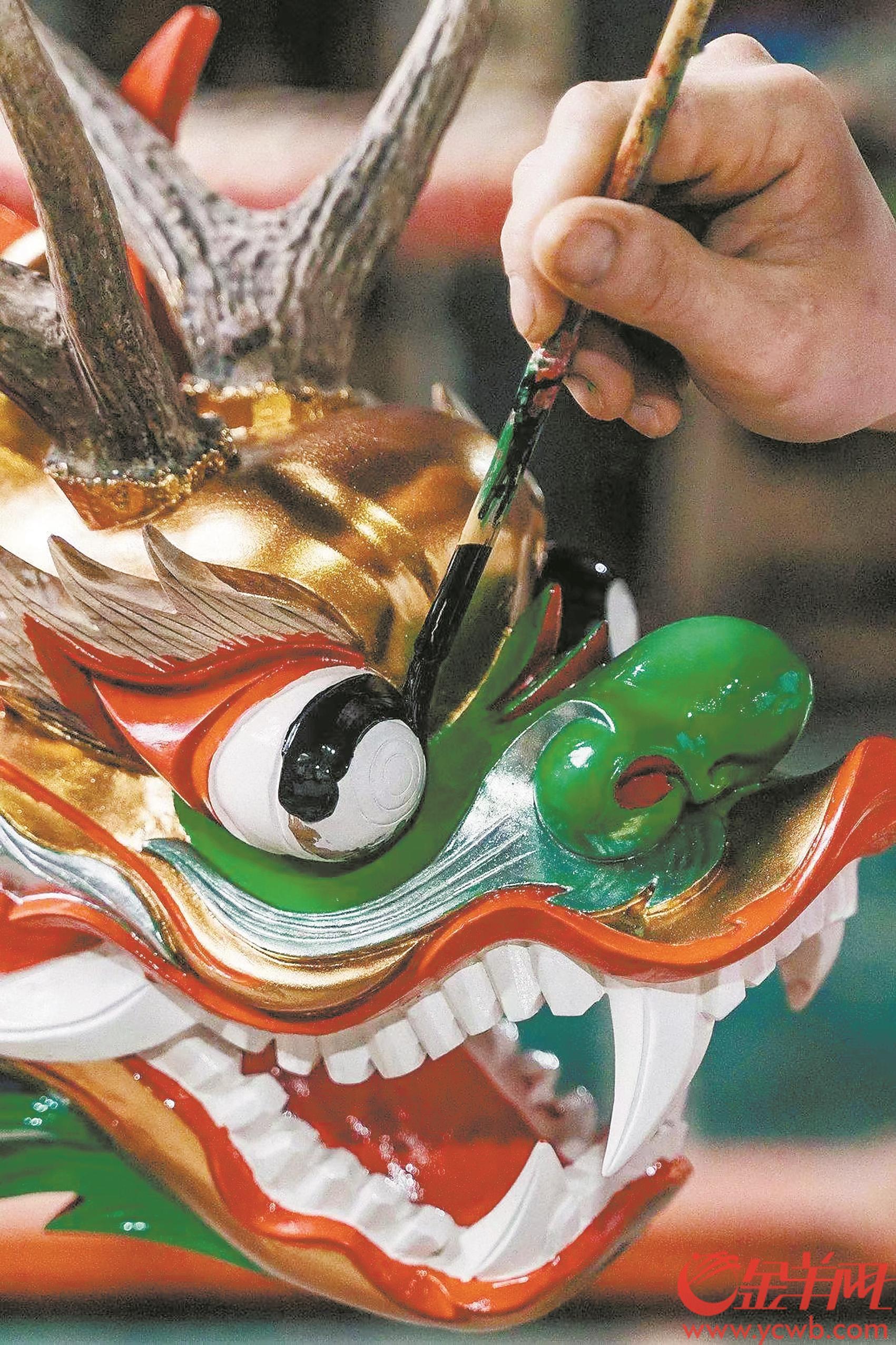 Zhang Weichao is carving the dragon head Liu Zhuonan Photo
Zhang Weichao is carving the dragon head Liu Zhuonan Photo
Inheritance:
Find the cultural roots behind the dragon head
In 2020, the “Dragon Boat Dragon Head and Dragon Tail Production Skills” was successfully applied for World Heritage, and Zhang Weichao became the inheritor of this intangible cultural heritage project. Transformed from a craftsmanBabaylan became the inheritor of intangible cultural heritage, and Zhang Weichao’s mentality has changed. “In the past, I was a craftsman, and I thought about how to be a leader and do my job well. But now I have more responsibility and responsibility. Intangible cultural heritage is a very precious and relatively rare thing. It may be a slowly disappearing culture. When we protect it, we want to disappear slowly and slower. It is a very honor for me to shoulder the inheritance of this historical and cultural heritage, and the responsibility is huge.” Today, Zhang Weichao often appears on major campuses and intangible cultural heritage inheritance activities. When teaching courses in school, Zhang Weichao not only teaches students how to carve, but more importantly, lets children understand the dragon boat and the cultural significance behind it. “The skills of dragon boats cannot be learned at once, but they must become interested in dragon boats. Cultivating their recognition of Chinese traditional culture and folk culture from an early age is our roots and soul.” Zhang Weichao said.
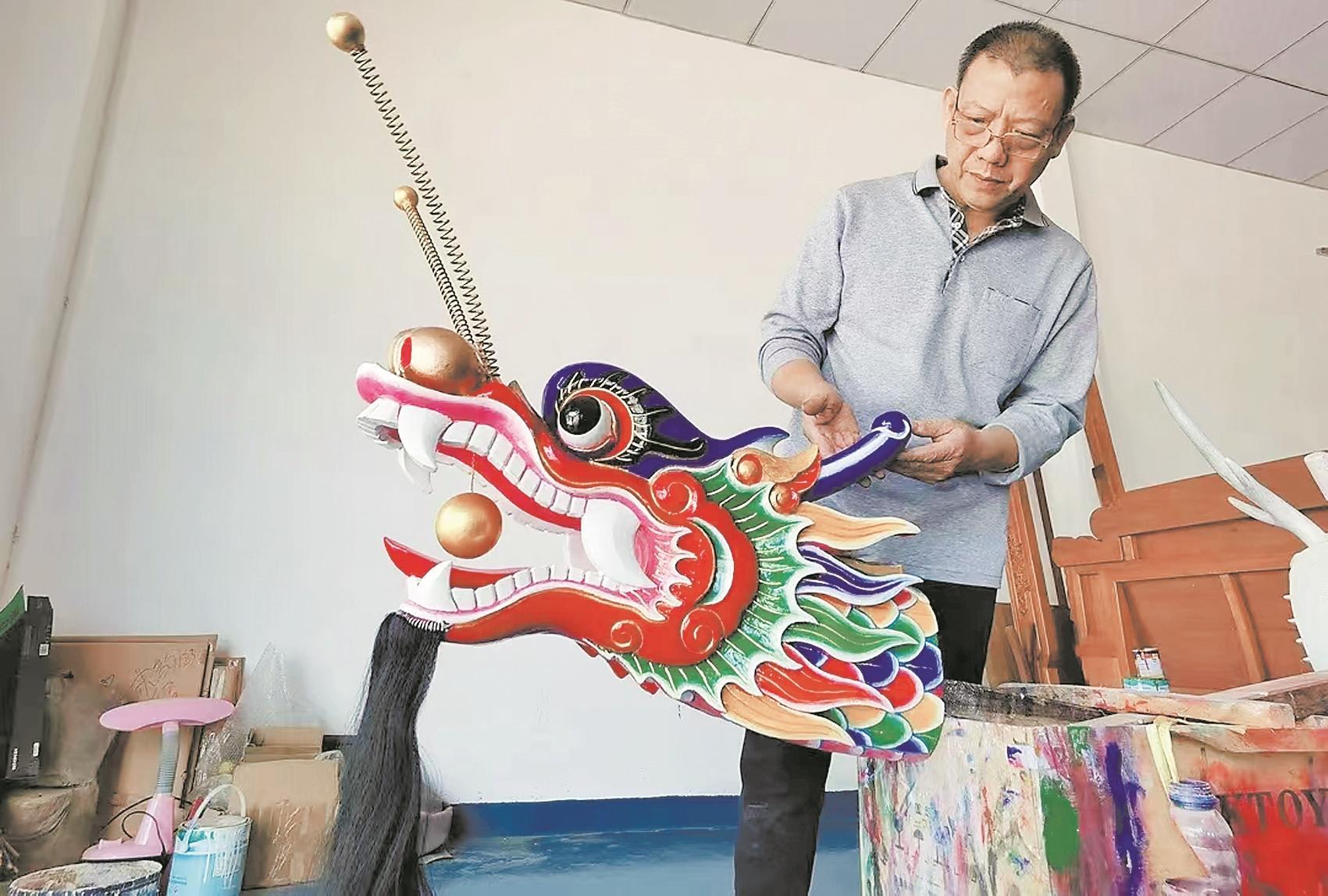 Chen Zhijun and his leading works Photo provided by the interviewee
Chen Zhijun and his leading works Photo provided by the interviewee
The “post-60s” craftsman uses the dragon bow to carry the spiritual beliefs of the people
Yangcheng Evening News All-Media Reporter Zhou Cong
Select materials, href=”https://funnybookish.com/”>Komiks Cutting, rough carving, fine carving, polishing, lacquering… “From the dragon’s mouth, dragon whiskers to the dragon scales, every time you cut the knife, it must be accurate, and it will be difficult to remedy if you fail.” Chen Zhijun, who has been learning art at the age of 15, has carved the dragon head for more than 40 years.
Chen Zhijun was born in Xiancun Town, Zengcheng District, eastern Guangzhou. The river network here is crisscrossing, making it the most prosperous hometown of the Dongjiang River Dragon Boats. Dragon head carving (traditional dragon boat) is a traditional carving technique in Xiancun Town, Zengcheng.
As a district-level intangible cultural heritage inheritor, Chen Zhijun recalled that since he was 15 years old, he learned carpentry with his father. Since he was 18 years old, he often learned the craftsmanship of carving his father by watching it by watching it. It was not until the age of 22 that Chen Zhijun began to carve the first dragon head.
It is understood that the last century Babaylan was in the 1980sIn the early days, after the revival of the folk dragon boat activities, dragon boat production had not yet entered shipyard production. If the village collective wants to order dragon boats, it must hire a shipbuilder to come to build ships in the village, and also find a master to carve the dragon head. Because the Chen family has a certain popularity, many local and surrounding people will hire Chen Zhijun’s father to carve the faucet. Chen Zhijun also developed excellent carving skills under such a background.
With the development of dragon boat activities, the dragon shipyard began to appear. From shipbuilding to carving the faucet, the shipyard took all the links. The craftsmen who carved dragon leaders in folk began to fade out of people’s sight, and Chen Zhijun was one of them.
Until in recent years, the local youth dragon boat team in Xiancun customized a new dragon boat. The dragon boat team hoped to carve a new dragon boat in accordance with the traditional old dragon head. They inquired with the elderly in the village and learned that Chen Zhijun, the owner of the furniture factory in the town, was the inheritor of the Chen family’s dragon head carving, so they came to ask Chen Zhijun to “come out” again. When Chen Zhijun studied with his father, he was taught to understand the dragon boat culture contained in the bow of the dragon boat. Only in this way can he carve a dragon head with outstanding craftsmanship and both spirit and form.
“Traditionality cannot be lost, the foundation cannot be missing. The essence of the Dongjiang dragon boat lies in the dragon boat’s bow! I hope to carve a vital dragon boat’s bow, and I will use it as a work of art.” Chen Zhi, Chen Zhi, has his own unique view on carving a dragon boat.
The dragon head of a dragon boat represents the image of a village, especially the old dragon head left behind in the past. It records different stories of each village and is the carrier of dragon boat culture. Therefore, the essence of dragon boat lies in the dragon head. In the Dongjiang River Basin, dragon head is a major feature of dragon boats.
Whenever a villager comes to make a dragon boat bow, Chen Zhijun will ask about the historical folk allusions in the other village, and then integrate the characteristics of the gods believed in in each place into the creation of the dragon head, so each dragon head is unique. “I am happy that the villagers are satisfied with the leader,” said Chen Zhijun.
Chen Zhijun told reporters that during the carving process, you must also integrate your imagination and treat the dragonThe bow of the ship is recreated in all aspects, both similar in spirit and shape. A dragon boat with excellent craftsmanship should show exquisite and convexity. Every angle is beautiful. When the dragon boat is lifted up on the river, it feels like it is flying. The dragon head should also feel like it jumps out of the water and fly up, and should be vital.
In Chen Zhijun’s view, the traditional culture behind the dragon boat reflects the people’s spiritual beliefs and emotional support. What he adheres to is the dragon boat spirit that works together and never gives up, and the folk vitality of uplifting and uplifting. The material carrier of this spiritual civilization is the “Dragon Boat Head”.